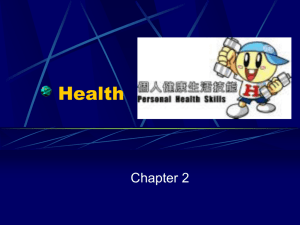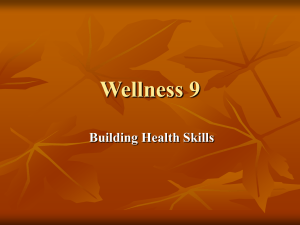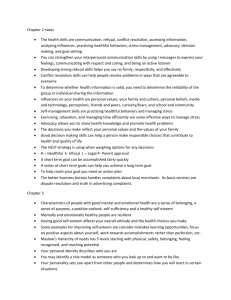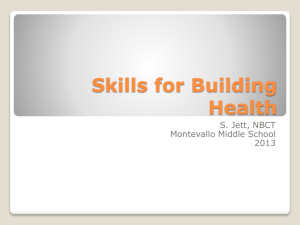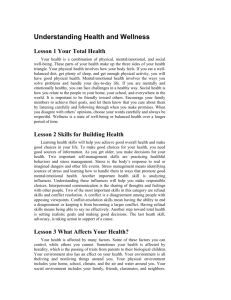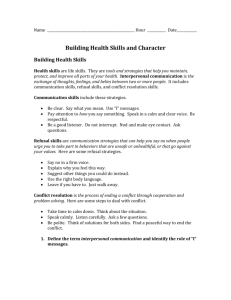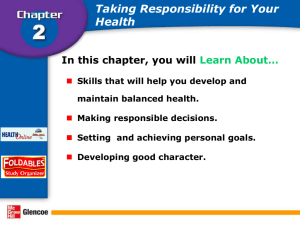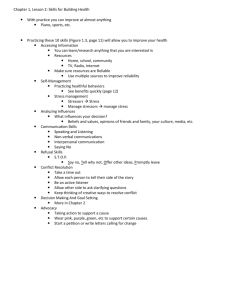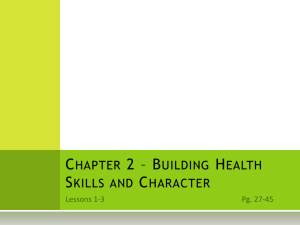Chapter 2 Building Health Skills and Character
advertisement
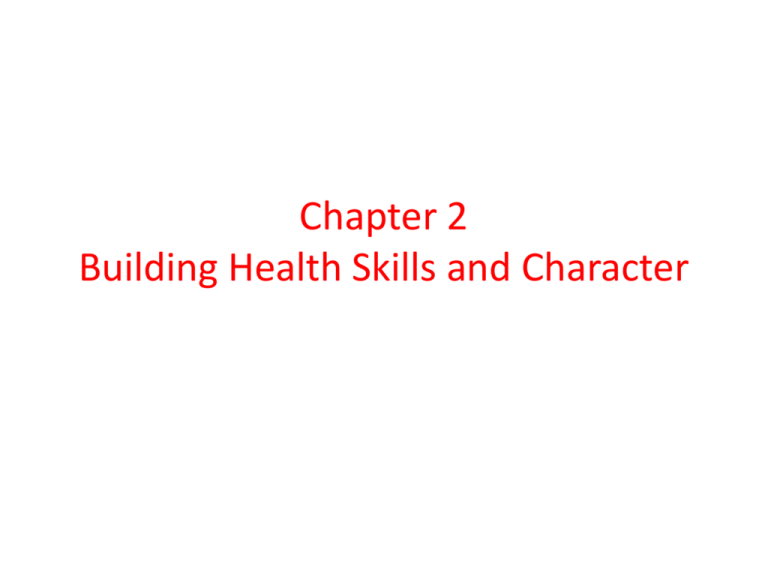
Chapter 2 Building Health Skills and Character Building Health Skills • The choices and you make and the actions you take can affect your health • Taking responsibility for your health begins with a commitment to take charge of your actions and behaviors in a way that reduces ricks and promotes wellness • The first step is to develop health skills • Health skills , or life skills, are specific tools and strategies that help you maintain, protect, and improve all aspects of your health Interpersonal Skills • One of the traits of a health-literate individual is having effective communication skills • Effective communication involves not only making yourself heard but also being a good listener • Interpersonal communication is the exchange of thoughts, feelings, and beliefs between two or more people Strategies for Effective Communication #1 • Clearly say what you mean – Use “I” messages to state your position, for example, “I feel frustrated when our plans change.” This helps you avoid placing blame on others Effective Communication #2 • Pay attention to how you say something – Use a respectful tone – Make sure your facial expressions and gestures reflect your verbal message Effective Communication #3 • Be a good listener p. 257 – Avoid interrupting the speaker, and show that you are listening by nodding or asking appropriate questions Refusal Skills • Think about how you handle situations in which you are asked to do something that you know is harmful or wrong • In such circumstances, you need to use refusal skills • Refusal skills are communication strategies that can help you say no when you are urged to take part in behaviors that are unsafe or unhealthful, or that go against your values • Practicing these strategies will help you resist risky behaviors Refusal Skills • Say no in a firm voice – Do this calmly and clearly. Use expressions such as “I’d rather not.” • Explain why – State your feelings. • Suggest alternatives – Propose a safe, healthful activity to do instead • Use appropriate body language – Make it clear that you don’t intend to back down from your position. Look directly into the other person’s eyes. • Leave if necessary Conflict Resolution Skills • In addition to practicing effective refusal skills, it is important to develop strategies for dealing with conflicts or disagreements • Conflict resolution is the process of ending a conflict through cooperation and problem solving • The key to conflict resolution is respecting the other person’s rights as well as your own • Willingness to compromise will also help achieve a resolution that satisfies everyone Conflict Resolution • Take time to calm down and think through the situation • When discussing the conflict, speak calmly and listen attentively, asking questions when appropriate • Use a polite tone and try to brainstorm solutions where no one loses respect • Work to resolve the conflict peacefully Self-Management Skills • When you practice self management, you take responsibility for your health and act in specific ways that promote your wellness • Two self-management skills, practicing healthful behaviors and managing stress, help provide a foundation of good health Practicing Healthful Behaviors • Healthful behaviors are more than just actions that can protect you from illness or injury • Practicing healthful behaviors also involves expressing your feelings, building your selfesteem, and maintaining healthy relationships Managing Stress • Stress, the body’s and mind’s reactions to everyday demands, is a natural part of life • Learning stress management, or ways to deal with or overcome the negative effects of stress, will become increasingly important as you assume more responsibility for your health and take on additional roles as an adult • What are some activities you do to relieve stress? Analyzing Influences • Internal influences, which include knowledge, values, likes, dislikes, and desires, are based on experiences and your perspective on life • External influences, which come from outside sources, include your family, your friends, and peers, your environment, your culture, laws and the media • As you become aware of these influences, you will be better able to make healthful choices about everything from your personal behavior to which healthy products you buy Advocacy • Advocacy is taking action to influence others to address a health-related concern or to support a health-related belief • This skill enables you to positively influence the health of those around you Chapter 1 Lesson 1 • • • • P.32 Reviewing Facts and Vocabulary #’s 1 – 3 P. 32 Thinking Critically #’s 4 – 5 Please write the question and the answer Skip a line between each question Chapter 2 Lesson 2 Making Responsible Decisions and Setting Goals The Decision-Making Process • Decision-making skills are steps that enable you to make a healthful decision • The steps are designed to help you make decisions that protect your rights and health while respecting the rights and health of others • P. 34 Figure 2.3 Setting Personal Health Goals • Setting goals can help you shape your life in positive ways by focusing your energy on behaviors that you want to develop or change • A goal is something you aim for that takes planning and work • Goal setting is also an effective way to build self-confidence, increase your self-esteem, and improve your overall health Types of Goals • Every goal involves planning • When you set a goal and plan strategies to reach it, you will need to consider how much time it will take to accomplish the goal • A short-term goal is a goal you can reach in a short period of time • A long-term goal is a goal that you plan to reach over an extended period of time Goals • A short-term goal is accomplished within one week to one month • A long-term goal is accomplished within one month to one year • To accomplish goals over a year, you have to set short term goals to reach your goal Achieving Your Goals • To establish and reach your goals, create an action plan, or a multistep strategy to identify and achieve your goals • See p. 36 Chapter 2 Lesson 3 Building Character Building Character • As you have learned, it is important to consider and act on your most important beliefs and values when making a decision • Values shape your priorities, and they help you distinguish right from wrong • Character can be defined as those distinctive qualities that describe how a person thinks, feels and behaves What is Good Character? • Good character is an outward expression of inner values • A person with good character demonstrates core ethical values: responsibility, honesty, integrity, and respect • Core ethical values are the highest of all human values, and they guide you toward responsible choices • When you behavior reflects such standards, you can feel confident that you are demonstrating the traits of a person with good character Character and the Health Triangle • Because your character plays a significant role in your decisions, actions, and behavior, it impacts all aspects of your health • Developing good character enhances each side of your health triangle Traits of Good Character • There are several different traits that contribute to good character • Figure 2.4 identifies six primary traits of good character • Developing and strengthening these traits will assist you in becoming a responsible individual • https://www.youtube.com/watch?v=U3nT2KD AGOc Developing Your Character • Character and core ethical values are learned when you’re young and developed throughout your life • To take a more active role in your character development: – Stand up for your beliefs – Learn from people who demonstrate good character traits – Join volunteer groups in your school or community Positive Role Models • Having positive role models is important in developing and strengthening good character • A role model is someone whose success or behavior serves as an example for others • They can inspire and encourage basic values such as working hard, staying focused, planning ahead, being honest, and engaging in safe behaviors Think about it… • Write down a role model in your life • What character traits does this role model demonstrate? Character • When your behaviors reflect good character, you may inspire others to act in kind, responsible ways, too • In return, you will experience increased feelings of self-worth, satisfaction, and a sense of purpose Demonstrating Character • What ways can we demonstrate character?
